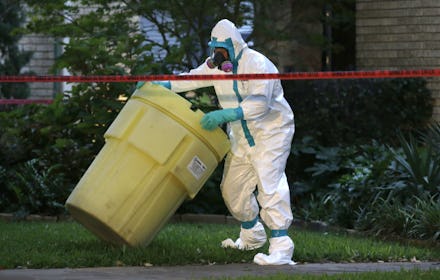A Texas College's New Policy Sums Up What's Wrong With How We Talk About Ebola

The news: Ebola hysteria has reached a fever pitch at one Texas college, where fears over the disease are trumping evidence-based approaches to student safety.
Navarro College in Corsicana has implemented a disturbing new policy: It's refused to accept international students from "countries with confirmed Ebola cases."
Thirty-three-year-old Nigerian-American academic Idris Ayodeji Bello was alarmed when his colleague's brother-in-law was rejected on the basis of this policy, receiving a letter Bello then posted to Twitter:
"I didn't believe it, I was so surprised. I thought, 'This cannot be,'" Bello told the Daily Beast. "I've had several people in the community act that way, but this is the first time I was going [heard] that from an institution — an institution of learning, for that matter."
The Daily Beast called the policy a "new low in Ebola racism," while Mediaite slammed the college for assuming every affected African country was "Ebola-land." After "repeated" requests for clarification, the college told CNBC they were standing by the policy, and in a statement on their website insisted the story was being promoted with "misinformation."
Why this is so ignorant: Navarro's new Ebola policy is emblematic of the panicked public response to the worrying hemorrhagic fever.
Additionally, the Centers for Disease Control and Prevention does not advocate that colleges quarantine or bar entry to students, faculty or staff who have traveled to affected countries, instead simply saying that they maintain awareness of potential risks and remain alert to potential symptoms.
While Ebola has been pretty much eradicated from Nigeria and Senegal, it continues to linger in Texas less than an hour's drive from Navarro, where three people have come down with the disease. By Navarro's standards, it should start by looking in its own backyard:
This isn't about safety, it's about xenophobia: There's a dark strain running through Navarro's logic of protecting itself from Ebola by keeping out foreign students. Rather than following CDC and WHO guidelines (which, while imperfect, are based on evidence and experience combating the disease), Navarro is insulating itself against foreign influences, reinforcing the idea that foreigners should be treated as plague-bearers rather than people.
"In the Western media," Portuguese illustrator André Carrilho told Mic, "there are First World diseases and Third World diseases, and the attention devoted to the latter depends on the threat they pose to us, not on a universal measure of human suffering."
Why it matters: Not only is Navarro's anxiety troubling on a social and cultural level, it's also just one more unhelpful way in which Americans are panicking. New England physician Russell Saunders penned a column for the Daily Beast expressing exasperation about a flood of patients convinced they had Ebola, despite the near-zero risk that they had contracted it.
This unfortunate panic is spreading. A Washington Post/ABC News poll found that 65% fear the possibility of a widespread epidemic which doctors agree is extremely unlikely, and 67% supported travel restrictions from the affected countries. The Washington Post reports that such restrictions could make the epidemic much worse by "preventing the movement of supplies and personnel needed to contain the outbreak in west Africa" — and if it's not contained there, the risk grows for all of us.
By contributing to this misinformed fear, Navarro is helping make things worse.
"I understand the fear about Ebola, but we're not going to tackle epidemics by being scared or by misinformation. It's going to be true education," Bello told the Daily Beast. "They are teaching students to be leaders in the future. Someone from that school needs to step forward and say, 'Listen, we made a mistake. We are going to fix that mistake.'"